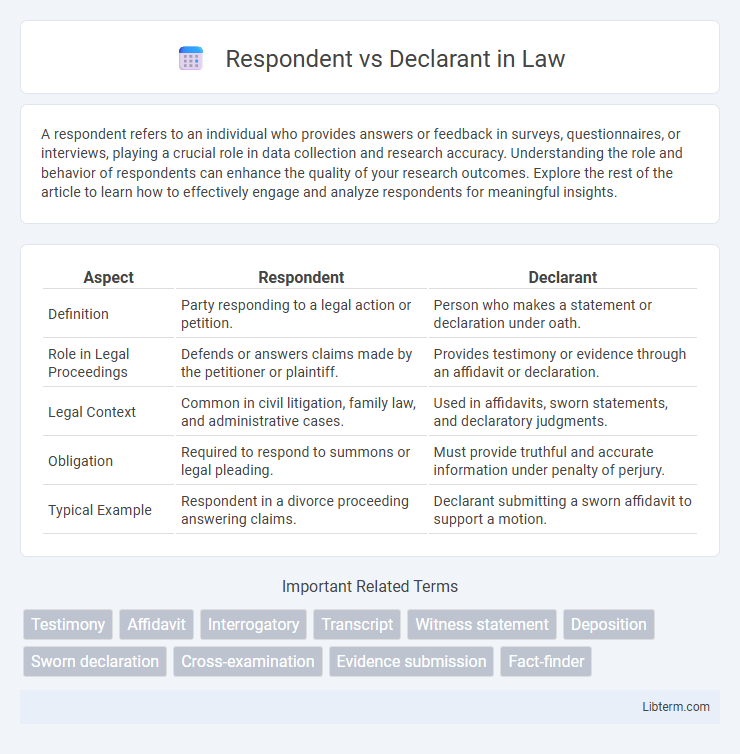A respondent refers to an individual who provides answers or feedback in surveys, questionnaires, or interviews, playing a crucial role in data collection and research accuracy. Understanding the role and behavior of respondents can enhance the quality of your research outcomes. Explore the rest of the article to learn how to effectively engage and analyze respondents for meaningful insights.
Table of Comparison
| Aspect | Respondent | Declarant |
|---|---|---|
| Definition | Party responding to a legal action or petition. | Person who makes a statement or declaration under oath. |
| Role in Legal Proceedings | Defends or answers claims made by the petitioner or plaintiff. | Provides testimony or evidence through an affidavit or declaration. |
| Legal Context | Common in civil litigation, family law, and administrative cases. | Used in affidavits, sworn statements, and declaratory judgments. |
| Obligation | Required to respond to summons or legal pleading. | Must provide truthful and accurate information under penalty of perjury. |
| Typical Example | Respondent in a divorce proceeding answering claims. | Declarant submitting a sworn affidavit to support a motion. |
Introduction: Understanding Respondent vs Declarant
The terms "Respondent" and "Declarant" hold distinct roles in legal contexts, where a Respondent is typically the party answering or defending against a claim, while a Declarant is the individual providing a statement or testimony under oath. Understanding these definitions is crucial for interpreting legal documents, testimonies, and court proceedings accurately. Clarifying the function of each role enhances comprehension of procedural steps and evidentiary standards in judicial and administrative settings.
Definitions: Who is a Respondent?
A Respondent is an individual or party who answers or replies to a petition, complaint, or legal proceeding initiated by another party, known as the petitioner or plaintiff. In legal contexts, the Respondent must respond to the allegations or claims presented, often within a specified time frame. This role is central in civil cases, administrative hearings, and appeals where the Respondent defends their position against the initiating party's assertions.
Definitions: Who is a Declarant?
A declarant is an individual who makes a statement or declaration, often under oath, that is relevant to a legal proceeding or investigation. In contrast, a respondent is typically the party who responds to a complaint or legal action initiated by another party. The declarant's statements can be used as evidence, especially in testimonial contexts or hearsay exceptions within legal frameworks.
Key Differences Between Respondent and Declarant
The key differences between a respondent and a declarant lie in their legal roles and functions: a respondent is the party against whom a legal action or petition is filed, while a declarant is the individual who provides a formal statement or testimony, often under oath. In court proceedings, the respondent typically defends against claims or accusations, whereas the declarant offers evidence or factual assertions to support a case. Understanding these distinctions is crucial for properly identifying responsibilities and rights within legal contexts, ensuring accurate procedural adherence.
Legal Contexts for Respondents
In legal contexts, a respondent is the party who responds to a petition or appeal, often found in cases such as family law, administrative hearings, and appellate courts. Respondents are responsible for presenting evidence and arguments to counter the claims made by the petitioner or appellant. Their role is crucial in ensuring that courts receive a balanced perspective for fair adjudication of disputes.
Legal Contexts for Declarants
Declarants in legal contexts provide statements or evidence based on firsthand knowledge, critical in affidavits and witness testimonies. Their declarations are often subject to hearsay rules, with exceptions allowing their statements to be admissible under specific legal standards. Understanding the distinction between declarants and respondents is essential for proper evidence evaluation and courtroom procedures.
Roles and Responsibilities: Respondent vs Declarant
The respondent is the party required to answer or defend against claims in legal proceedings, responsible for providing evidence and testimony to counter the plaintiff's assertions. The declarant, often a witness in court cases, is responsible for making statements or providing sworn testimony based on personal knowledge or observation. While the respondent actively participates in litigation defense, the declarant's role centers on delivering factual accounts that support or challenge the case.
Examples in Legal Proceedings
In legal proceedings, a respondent is the party who responds to a petition or appeal, such as in family law cases where the respondent answers divorce petitions or custody disputes. A declarant, by contrast, is the individual who makes a statement or declaration under oath, often seen in affidavits or depositions used as evidence in court. For example, in a civil lawsuit, the respondent defends against claims, while the declarant provides sworn testimony that supports or refutes specific facts in the case.
Importance of Distinguishing Respondent from Declarant
Distinguishing a respondent from a declarant is crucial in legal and psychological contexts to ensure accurate attribution of statements and proper evaluation of evidence. The respondent is the party answering or responding in a case, while the declarant is the individual who originally made a statement or declaration. Misidentification can lead to misinterpretation of testimony, affecting case outcomes and the credibility of evidence presented in court or investigations.
Conclusion: Choosing the Correct Term
Selecting between respondent and declarant depends on the legal context of the case, with respondent referring to the party responding to a petition or appeal, while declarant signifies the person making a statement or declaration. Accurate use of these terms ensures clarity in legal documentation and effective communication in court proceedings. Misapplication can lead to misunderstandings, impacting case outcomes and procedural fairness.
Respondent Infographic

 libterm.com
libterm.com